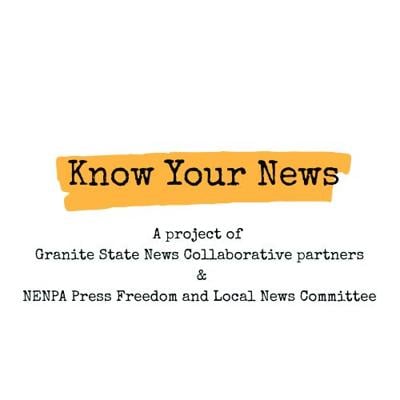Every year, deep financial troubles lead to the folding of local newspapers in the country. Over the last two decades, more than one-third of the country’s newspapers have vanished, all because the digital age has changed how people access and consume the news.
Last month, Illinois-based News Media Corp. shut down dozens of operations across five states, leaving almost 30 communities in the West and Midwest without any source of local news.
New England, too, is no stranger to seeing an industry struggling to stay afloat. According to Northwestern University’s Medill Local News Initiative database, the region lost a total of 17 daily and weekly newspapers from 2023 to 2024:
• Connecticut lost four weekly newspapers, with the total of dailies and weeklies falling from 56 to 52 in the period.
• Maine, lost five weeklies, down from 48 to 43 newspapers
• New Hampshire lost one daily and one weekly in the period and had a total of 28 outlets in 2024.
• Rhode Island lost one daily and weekly newspaper in the period and had a total of 22 newspapers in 2024.
• Vermont lost one daily and three weeklies in 2023, and had a total of 31 news outlets in 2024, down from 35.
The closings left several counties in those states with no local news outlet. But there was a bright spot: Massachusetts, where the number of weekly newspapers jumped from 97 to 114 in the period and wound up with a total of 142 newspapers, despite the loss of a daily in 2023.
“Journalism is not dying,” Concord Monitor publisher Steve Leone said previously. “It’s in need of a different model. Journalism needs to succeed in all its forms. Not one form. We need to support each other and hold each other accountable.”
That model, in many cases, is increasingly digital and not-for-profit.
Communities rebuild local news
In many cases, once a newspaper shuts, there is no succession plan, and small-town newspapers are closing not only for lack of robust finances but also because no one simply knows how to run them, or has the will to do so.
As grim financial realities lead to the closure of newspapers, many communities step up to rebuild local reporting in their areas.
New Hampshire’s Hollis-Brookline News is one example of an organization that emerged as a community group project.
Its publisher, Juliana Rowland, has no professional experience in journalism but has been an avid consumer of the news her whole life, and knows what it is like to live in a local news desert.
In 2020, several years after The Hollis Times folded, Rowland and a group of other concerned residents came together to start a community newspaper with the help of the community’s Rotary Club.
“It is a Rotary service project with impact,” Rowland said.
Run with a budget of $1,000 a year and with the help of volunteers and, at times, entries from high school journalism students, the online news website was born out of a lack of local news sources, and Rowland said the information vacuum was taking away from the town’s identity. With no full-time staff, the online paper now publishes content from press releases, town notices and volunteer-submitted original stories.
“I think what changed was having someplace to go, to know what was going on in town, to know what was happening with the schools, and get to know other important stories,” Rowland said, adding that she joined a slew of Facebook groups, and visited town websites to read notices on important information.
As Hollis-Brookline News slowly grows its digital presence, reaching almost 5,000 to 6,000 users each month — and up to 11,000 during election season — Rowland is appreciative of how far the project has come.
“Everybody that knows about us says, ‘Thank you,’ and they appreciate it so much,” Rowland said.
The Belmont Voice: A well-funded startup
“If you're going to start a newspaper, approach it as a business problem before you approach it as a journalism problem. If you know, it's not any great trick to publish a newspaper,” said Jesse Floyd, editor-in-chief of the Massachusetts-based newspaper The Belmont Voice.
Launched in January of last year, The Voice is an independent nonprofit newsroom that prints once a week, and sends out a weekly newsletter with breaking news, upcoming stories and other information to subscribers. It debuted with almost $500,000 in grants, and has an operating budget of $200,000 per year.
The newspaper emerged as local residents expressed a drive to inform and educate people about what goes on in town after the Gannett-owned Belmont Citizen Herald started shrinking its coverage of the town.
“Belmont readers had gotten used to picking up the Belmont Citizen Herald and it being all news about Belmont. Then it was stories that were written about towns elsewhere that had issues similar to what was going on in Belmont,” said Floyd, a 30-year news veteran. “And the argument the corporation was making was that people in Belmont will read about a hypothetical rat infestation in Newton because they have rats too. I don't think that thinking worked out the way they planned it to.”
As the Citizen Herald became less and less about Belmont, people stopped reading it, and that’s when Floyd and a group of other residents came together to form what is today The Voice. It all started with a bunch of messages on Facebook calling for interested residents to come together to form a town newspaper.
“It was about a year and a half before we started publishing. They started holding meetings. There were a bunch of early adopters — people who were really passionate about this,” Floyd said. “And it was two years ago in March, I think, that they started to publish a newsletter, just emailing a newsletter out to people. And there was an enormous amount of fundraising.”
Now the nonprofit news organization is almost a year-and-a-half old, and The Voice mails its paper to almost every household in the town — almost 11,000 homes — and it garners almost 300 to 500 page views per online post.
As Floyd and other board members hope to expand the organization’s operations — hiring another full-time enterprise reporter — Floyd has some advice for other newsroom startups.
“Building something that's sustainable, something that's factual and accurate, requires infrastructure, requires advertising, requires fundraising, requires business support, so that the journalists can do their job,” Floyd said, “so that you nurture and enhance [reader] experience as news consumers. There's some media illiteracy now that has cropped up over the last five to 10 years, and you have to be patient and work to overcome that.”
This story is part of Know Your News — a Granite State News Collaborative and the New England Newspaper and Press Association's Press Freedom Committee initiative on why the First Amendment, press freedom, and local news matter. Don’t just read this. Share it with one person who doesn’t usually follow local news — that’s how we make an impact. More at laconiadailysun.com/knowyournews.


















(0) comments
Welcome to the discussion.
Log In
Keep it Clean. Please avoid obscene, vulgar, lewd, racist or sexually-oriented language.
PLEASE TURN OFF YOUR CAPS LOCK.
Don't Threaten. Threats of harming another person will not be tolerated.
Be Truthful. Don't knowingly lie about anyone or anything.
Be Nice. No racism, sexism or any sort of -ism that is degrading to another person.
Be Proactive. Use the 'Report' link on each comment to let us know of abusive posts.
Share with Us. We'd love to hear eyewitness accounts, the history behind an article.